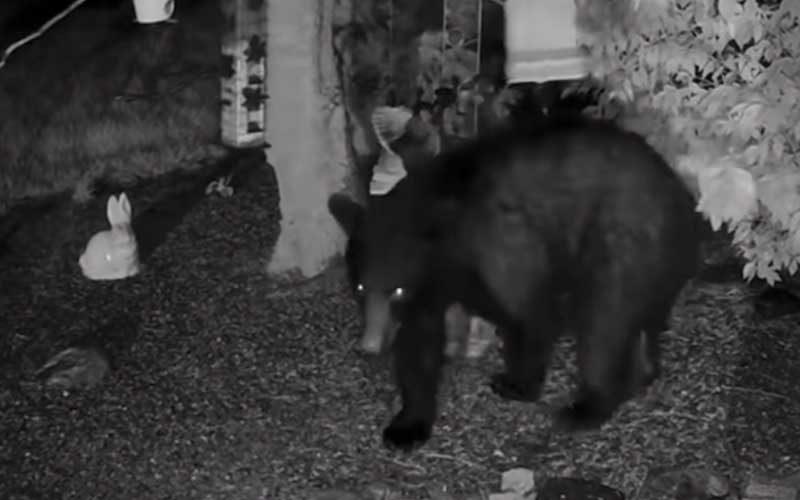FREEHOLD, NJ – Black bear sightings in Monmouth County are not uncommon, but one bear caught on video in Freehold is causing quite a commotion. Most likely in search of picnic baskets, this bear instead settled for birdseed from a few bird feeders in the backyard of a home on Coachmen Drive.
The sighting took place at around 5:30 am on Thursday. Police say there’s no threat to the public and people should just steer clear if they spot the animal and let it go on its way.
“There was a confirmed black bear sighting in the area of Coachmen Drive in Freehold Township around 5:30AM this morning,” the Freehold Township Police said. “The bear spent some time by a bird feeder and then ventured on. Department of Environmental Protection Officials advised there is no cause for concern based on their observations. We don’t have the same frequency of these sightings as other counties, but they do occur from time to time.”
According to the NJDEP, black bears are the largest land mammal in New Jersey. They are an integral part of the state’s natural heritage and a vital component of healthy ecosystems.
Since the 1980s the Garden State’s black bear population has been increasing and expanding its range both southward and eastward from the forested areas of northwestern New Jersey. Within the most densely populated state in the nation, black bears are thriving and there are now confirmed bear sightings in all 21 of New Jersey’s counties.
The DEP’s Fish and Wildlife personnel use an integrated approach in managing New Jersey’s black bear population, fostering coexistence between people and bears.
Black bears by nature tend to be wary of people. However, if you encounter a black bear in your neighborhood or outdoors while hiking or camping, follow these common-sense safety tips.
• Do not feed bears!
• Never feed or approach a bear!
• Remain calm if you encounter a bear. Do not run from it.
• Make the bear aware of your presence by speaking in an assertive voice, singing, clapping your hands, or making
other noises.
• Make sure the bear has an escape route.
• If a bear enters your home, provide it with an escape route by propping all doors open.
• Avoid direct eye contact, which may be perceived by a bear as a challenge. Never run from a bear. Instead, slowly
back away.
• To scare the bear away, make loud noises by yelling, banging pots and pans or using an airhorn. Make yourself look as
big as possible by waving your arms. If you are with someone else, stand close together with your arms raised above
your head.
• The bear may utter a series of huffs, make popping jaw sounds by snapping its jaws and swat the ground. These are
warning signs that you are too close. Slowly back away, avoid direct eye contact and do not run.
• If a bear stands on its hind legs or moves closer, it may be trying to get a better view or detect scents in the air. It is
usually not a threatening behavior.
• Black bears will sometimes “bluff charge” when cornered, threatened or attempting to steal food. Stand your ground,
avoid direct eye contact, then slowly back away and do not run.
• If the bear does not leave, move to a secure area.
• Report black bear damage or nuisance behavior to the DEP’s 24-hour, toll-free hotline at
1-877-WARN DEP (1-877-927-6337).
• Families who live in areas frequented by black bears should have a “Bear Plan” in place for children, with an escape route
and planned use of whistles and air horns.
• Black bear attacks are extremely rare. If a black bear does attack, fight back!
